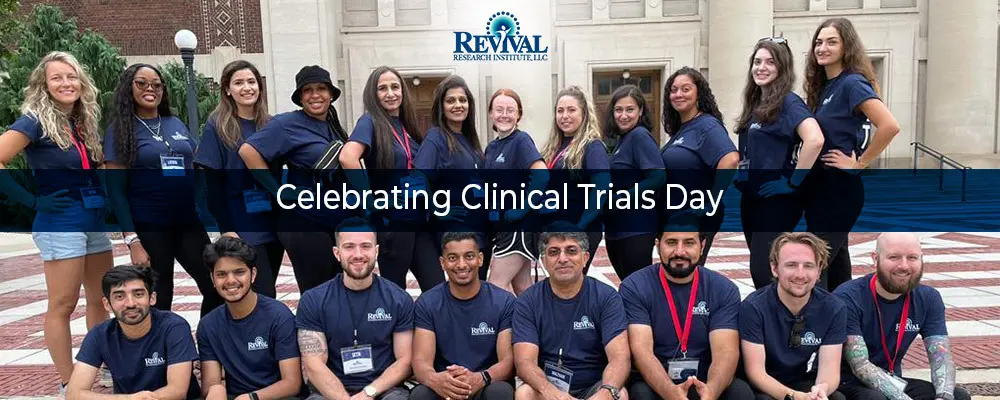International Clinical Trials Day 2023: Commemorating Innovation in Research
As we mark International Clinical Trials Day 2023, we celebrate not only a history steeped in clinical research but also a prospect brimming with boundless novel interventions. From investigation to administration, clinical trials ensure the safety and efficacy of the study intervention. For over 2 centuries, physicians have been using clinical trials to investigate viable treatments for debilitating conditions, making them an integral part of the medical landscape.
On International Clinical Trials Day, observed annually on May 20th, Revival Research Institute acknowledges the active contributions of clinical trials to medical advancement and its profound impact in revolutionizing healthcare.
On this International Clinical Trials Day 2023, delve into the history of clinical trials, the significance of clinical trials, decentralized clinical trials, and much more.
The History of Clinical Trials: From James Lind to Nuremberg
Over the years, researchers have actively undertaken clinical trials investigating viable therapies for widespread medical conditions. Along the road, there have been many difficulties, but clinical trials have led to important discoveries. This International Clinical Trials Day 2023, let’s acknowledge the tremendous efforts of the professionals that played an important role in clinical trials for decades to evolve health outcomes, for the better.
Dr. James Lind’s Scurvy Trial – 1747
The first recorded clinical trial was conducted by James Lind in 1747, investigating a cure for scurvy. International Clinical Trials Day 2023 is honored to commemorate the day he began the clinical trial.
First Placebo – 1800s
The first advent of a placebo in a clinical trial occurred in 1863 when Dr. Austin Flint coordinated a 13-person trial for rheumatism that involved administering a placebo. While the term placebo has been around since the early 1800s, its inclusion in Dr. Flint’s trial recognized it as a tool for assessing the impact of drugs.
Federal Food, Drug, and Cosmetic Act – 1938
In 1938, the Federal Food, Drug, and Cosmetic Act was enacted after the tragic sulfonamide incident. The effect of the toxic ingredient resulted in the death of 100 people. Since then, the FDA has been responsible for overseeing and enforcing regulations that ensure the safety and efficacy of drugs before they reach the market.
First Double-Blind Clinical Trial – 1943
Medical Research Council (MRC) conducted its first double-blind clinical trial investigating a treatment for a common cold. It served as a gateway to future double-blind clinical study design.
First Randomized Curative Trial – 1946
In 1923, the concept of randomization was introduced, but it wasn’t until 1946 that the first randomized clinical trial took place with allocation concealment.
Nuremberg Code – 1947
During World War II, the atrocities committed by Nazi doctors on prisoners were deemed inhuman. However, in 1947, Dr. Leo Alexander outlined six points that later expanded to ten. These ethical guidelines for conducting clinical research were known as Nuremberg Code. The code established:
- Principles of informed consent
- Voluntary participation
- Ability to withdraw from studies anytime
- Protection of subjects’ rights and wellbeing
About Clinical Trials
Celebrating International Clinical Trials Day 2023 is more than just a reflection of the past. It’s a rallying call to physicians and healthcare professionals worldwide, accentuating the need for advancing research through clinical trials.
Clinical trials are research studies to evaluate the safety and effectiveness of medical interventions or diagnostic methods. The fundamentals of clinical trials are to investigate and compare the novel intervention with the standard treatments for specific conditions.
Execution of clinical research involving human subjects requires approval from Independent Review Board (IRB). However, under FDA regulations, IRB owes the authority to approve or disapprove the research. In general, IRB ensures the safety and well-being of all participants in clinical trials receiving the investigational drug. Moreover, adhering to protocol guidelines provided by the sponsor is crucial in the conduct of clinical trials. In case of protocol deviation or any adverse event during a clinical trial, the regulatory team instantly reports it.
Clinical Trial Phases
A sequence of phases follows before concluding the safety and efficacy of an investigational drug. The following are the four phases of clinical trials:
Phase 1:
This phase involves a relatively small group of healthy volunteers receiving the intervention to evaluate its safety and dosage range.
Phase 2:
In this phase, a larger group of participants are present and are receiving the intervention to evaluate its effectiveness and side effects.
Phase 3:
Progressively, this phase further evaluates the safety, effectiveness, and side effects of the study drug in comparison to standard treatment.
Phase 4:
After the drug receives safety approval, the last phase of the trial involves post-market surveillance to monitor the long-term safety and effectiveness of the intervention.
The Era of Decentralized System: International Clinical Trials Day 2023
International Clinical Trials Day 2023 is particularly significant as the world faces the COVID-19 pandemic. Amidst COVID-19, clinical trials played a critical role in the investigation of COVID-19 vaccines.
As we look to the future, a new era of ‘digital trials’- Decentralized Clinical Trials, looks expeditionary to revolutionize patient care and accelerate medical breakthroughs with technology. Addressing the participants’ unmet requirements from the conventional clinical trial methodology, the hybrid approach offered by decentralized clinical trials pivots an improved patient-centric approach.
The benefits of incorporating technology and innovation in clinical trials are:
- Less burdensome for participants
- Better compliance and retention rates
- Improved accuracy
- Faster trial delivery
- Reduced cost of data collection
- More participants and researcher access
- Participant safety
- Long-term follow-ups
- Better decision making
International Clinical Trials Day 2023 & the Power of Participation
As we mark International Clinical Trials Day 2023, let’s use this occasion to highlight the crucial role of participants in making clinical trials successful. The brave individuals who volunteer in these studies are the unsung heroes of medical advancement. Their ability to take on the risks and challenges associated with clinical trials, trust in the integrity of the process, and contribution to the betterment of health outcomes deserves appreciation. Together we look ahead with hope and optimism to the future of medical research and breakthroughs that lie ahead.
As a clinical research organization, this International Clinical Trials Day 2023, we recognize all the participants who have trusted us in their part by enrolling in clinical trials. We thank you for your efforts and encourage you to consider participating in our upcoming studies.
Outlook
In conclusion, International Clinical Trials Day 2023 serves as a reminder of the significance of clinical trials in advancing the investigation of robust novel therapies for chronic conditions. From the development of life-saving interventions and vaccines to the discovery of novel treatments, clinical trials are essential in helping evolve the future of healthcare. Together we can forge a path to a healthy world, one clinical trial at a time.




